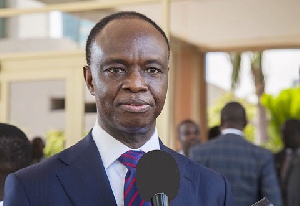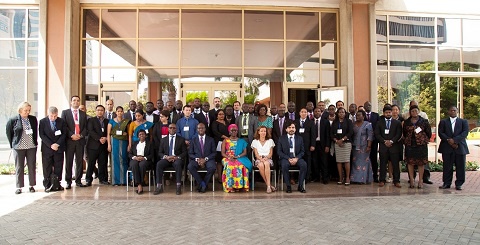 Joe Anokye, Acting Director General of the National Communications Authority
Joe Anokye, Acting Director General of the National Communications Authority
The Ghana National Coordinator of the Global Action on Cybercrime extended (GLACY+) programme has advocated for a shared Reporting System to combat the menace of cybercrime in the country. The National Coordinator, in the person of Mr. Joe Anokye, is also the Ag. Director General, of the National Communications Authority (NCA). He gave these remarks at a three-day International Workshop on Criminal Justice Statistics on Cybercrime and Electronic Evidence which opened in Accra on Wednesday, 29th March, 2017.
The National Coordinator for the GLACY+ project in Ghana, is responsible for coordinating the efforts of the various law enforcement agencies and judiciary to protect Ghanaians from the threat of cybercrime on the platform of the Budapest Convention. He was also recently appointed a member of the National Security Council, to support Government’s efforts in protecting the country’s critical national infrastructures.
The workshop which is being organised by the Council of Europe as part of the GLACY+ project is expected to interrogate the current systems available in each member country with regards to reporting, collating and interpreting statistics on Cybercrime and Electronic Evidence and build capacity to develop measures in this regard. It brought together several local and international law enforcement and justice professionals involved in collecting, collating and interpreting statistics for offences of cybercrime from countries including Mauritius, Philippines, Tonga, Sri Lanka and Morocco.
Mr. Joe Anokye, the GLACY+ National Coordinator, said, with Ghana’s total mobile data subscriptions at 20,064,110 and with a penetration rate of 70.90% at the end of January, 2017, Cybercrime cases are expected to escalate. He went on further to say that as new technologies and strategies are being developed daily to advance network security, they sometimes have the effect of preventing Law Enforcement and Justice Agencies from securing the much needed electronic evidence. To this end, Mr. Anokye called for the development of a shared system which would enable all relevant institutions upload cases and share information to avoid duplication of efforts and ensure data and statistics integrity.
Giving the keynote address, Mrs. Ursula Owusu-Ekuful, the Hon. Minister for Communications, noted that cybercrime poses challenges to the technological development of Ghana and called for concerted efforts of all users of the cyberspace. She also spoke of Government’s strategic plans to combat e-crime; these include the establishment of a National Cyber Security Council and a Cybersecurity Centre to oversee Cyber Security Incident Reporting and the establishment of a Forensic Laboratory in place to support investigations and prosecutions.
The workshop was facilitated by, Mr. Matteo Lucchetti, a Project Manager at the Council of Europe who has led the GLACY+ project in Ghana. Mr. Lucchetti was also involved with the 2016 GLACY+ assessment of the cybersecurity space situation in Ghana. Also at the opening ceremony was Mrs. Maria Luisa Trancoso, the Head of Governance of the EU Delegation in Ghana. She stated that government has a duty to protect citizens from crime and breach of privacy. She acknowledged that one of the biggest challenge in fighting cybercrime is under-reporting of cybercrime and a lack of statistics and data for analysis.

Cabinet in November 2016 approved Ghana’s accession to the Budapest Convention on Cybercrime which aims at harmonising national laws on e-crime, improving investigative techniques and increasing cooperation among nations to foster the protection of countries against cybercrime.
Ghana is one of the few African countries and presumably, the first in West Africa that has signed the treaty and has keenly taken steps to ratify the treaty pursuant to cabinet’s decision.